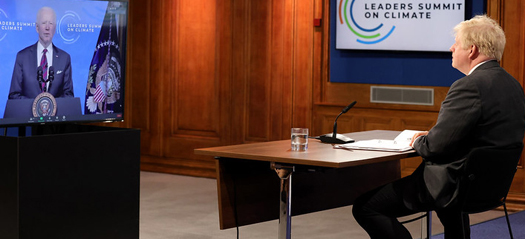
UK PM Boris Johnson, who is set to host COP26 later this year attends the virtual Leaders Summit on Climate.
(Credit: Andrew Parsons/No 10 Downing St)
On Earth Day, April 22, world leaders convened virtually at the Leaders Summit on Climate, hosted by US President, Joe Biden, to re-affirm their commitments to reducing carbon emissions. The event was in part, America’s attempt to take a leadership role in tackling climate change, but other leaders were not particularly inspired, as two previous administrations pulled out of landmark climate deals upon taking office. (President Bush took America out of the Kyoto Protocol, and President Trump backed out of the Paris Agreement.)
Some countries did commit to higher carbon reduction targets, but some major polluters did not. Canada vowed to cut carbon emissions by 40 per cent by 2030, up from its previous goal of 30 per cent. Russia made no mention of reducing its reliance on oil and gas but expressed a commitment to international cooperation in finding solutions for climate change.
India signed onto a deal with the United States, the US-India Climate and Clean Energy Agenda 2030 Partnership, a political commitment to strengthen the bilateral commitment to clean energy between the two nations.
President of the African Development Bank, Akinwumi Adesina, pledged to reach 40 per cent in climate financing by the end of this year, up from 35 per cent in 2019.
South African President, Cyril Ramaphosa, called on leaders of developed nations to assist in climate financing for African nations because of climate change’s disproportionate impact on the continent. Africa suffers some of the worst effects of climate change, in the form of droughts, floods, and pests that decimate crops.
UK Prime Minister, Boris Johnson, received vast attention on social media for his comments that climate change was about more than “bunny-hugging” and instead served as a major economic opportunity for job growth and innovation.
Swedish climate activist Greta Thunberg trolled Johnson on Twitter by changing her description to “bunny hugger” .Thunberg has bluntly called-out world leaders in the past for their attempts to fix climate change using the same thinking of infinite economic growth that caused the crisis.
The UK is set to host COP26 later this year in Glasgow, and Johnson announced plans to cut emissions by 78 per cent from 1990 levels by 2035, as was recommended by an independent climate change committee. Surprisingly, Chancellor of the Exchequer, Rishi Sunak seems to be on board with the plan, which improves its chances of successful implementation, but as Sunak’s first budget priority is coronavirus, environmentalists are unsure if Johnson’s ambitious plan will come to fruition. The US pledged to reduce its carbon emissions by 50 per cent from 2005 levels by 2030, a surprisingly ambitious goal that may require executive action.
The New York Times daily podcast reported that Biden’s infrastructure plan may include a “clean electricity standard,” which would call for 80 per cent of US-generated electricity to come from zero-carbon sources by 2030. This would be a game-changer for American utility companies and for the country’s ability to meet its emissions targets.
China
China is currently the world’s largest polluter and does not intend to reach peak emissions until 2030, as laid out by the Paris Agreement. Before the summit, US climate envoy, John Kerry, travelled to Shanghai to meet his Chinese counterpart Xie Zhenhua to discuss the two countries’ cooperation on the climate crisis. The joint statement, published at the conclusion, mentioned renewable energy deployment, climate-resilient agriculture, and reducing transportation emissions including those related to aviation and maritime activities.
At the Leaders Summit on Climate, however, China did not increase its carbon reduction goals, but talked about weaning itself off of coal power generation after 2025. At a virtual event hosted by the Council on Foreign Relations, Chinese Foreign Minister, Wang Yi, said that China would be more willing to work with the US on climate-related issues, “If the United States no longer interferes in China’s internal affairs,” referring to Hong Kong, Taiwan and Xinjiang.
How clean is “clean energy”?
While world leaders champion their commitment to transitioning to renewable energy sources, the creation of the materials that deploy these technologies can have terrible ecological consequences, comparable to fossil fuels. The resource extraction required to create electric car batteries, for example, may create new ecological crises. Al Jazeera came out with a documentary called, “The Dark Side of Green Energy,” which explores how mining rare metals like lithium and copper cause pollution and destruction of large swathes of land. Rare metals are also used in wind turbines and solar panels. As the clean energy revolution ensues, countries with large deposits of these rare earth metals, like Chile and Bolivia, could see their economies transformed. China already boasts extensive rare metal deposits and has hundreds of working mines and refineries around the country.
The Leaders Summit on Climate served as the US President’s way of showing the world that America was ready to work with international leaders on climate, as well as other issues, again. While some countries committed to more ambitious targets, and maybe on their way to meet them, much of the responsibility lies upon the shoulders of the largest polluters—China, the US, India, and Russia— and if serious investments are not made into their infrastructures bring on the renewable energy revolution, other countries’ commitments may not go far enough to keep warming well below the Paris Agreement’s stated target of 2C.
Sarah Sakeena Marshall, Staff Writer, Grit Daily, Environmental Columnist, The Muslim News